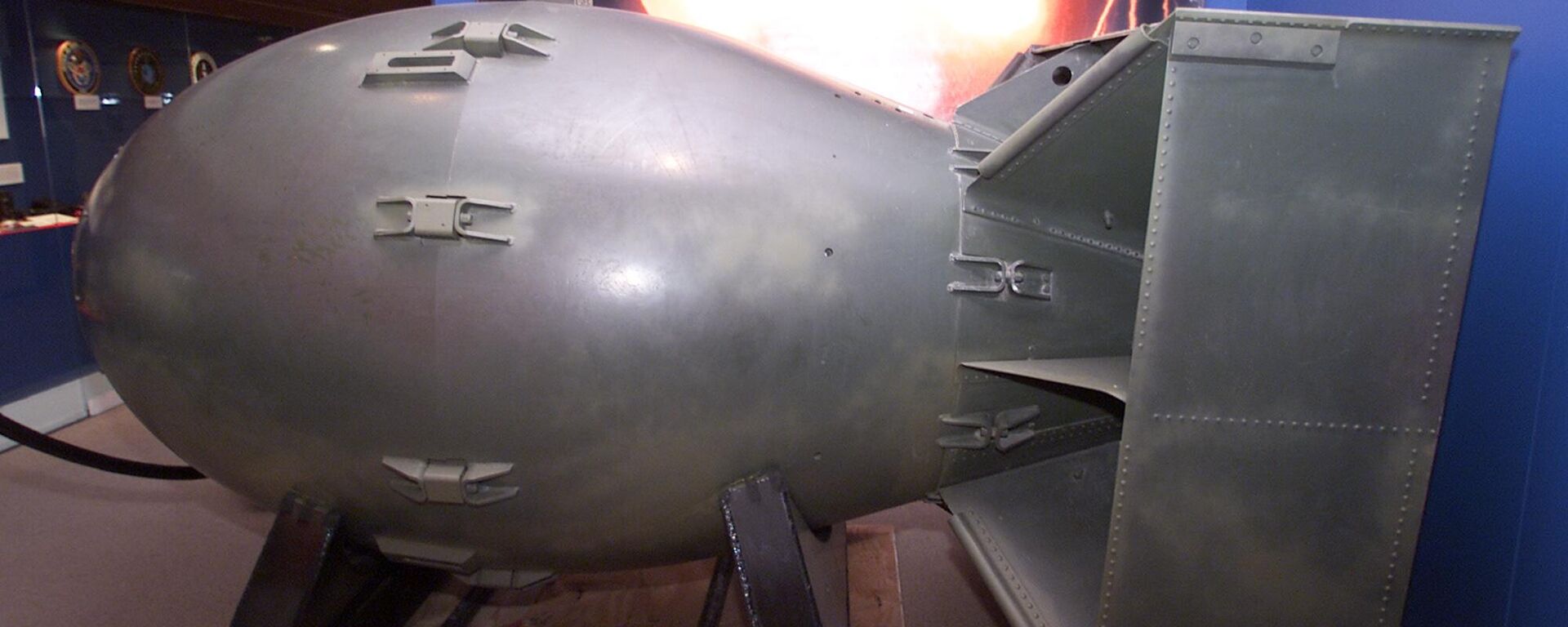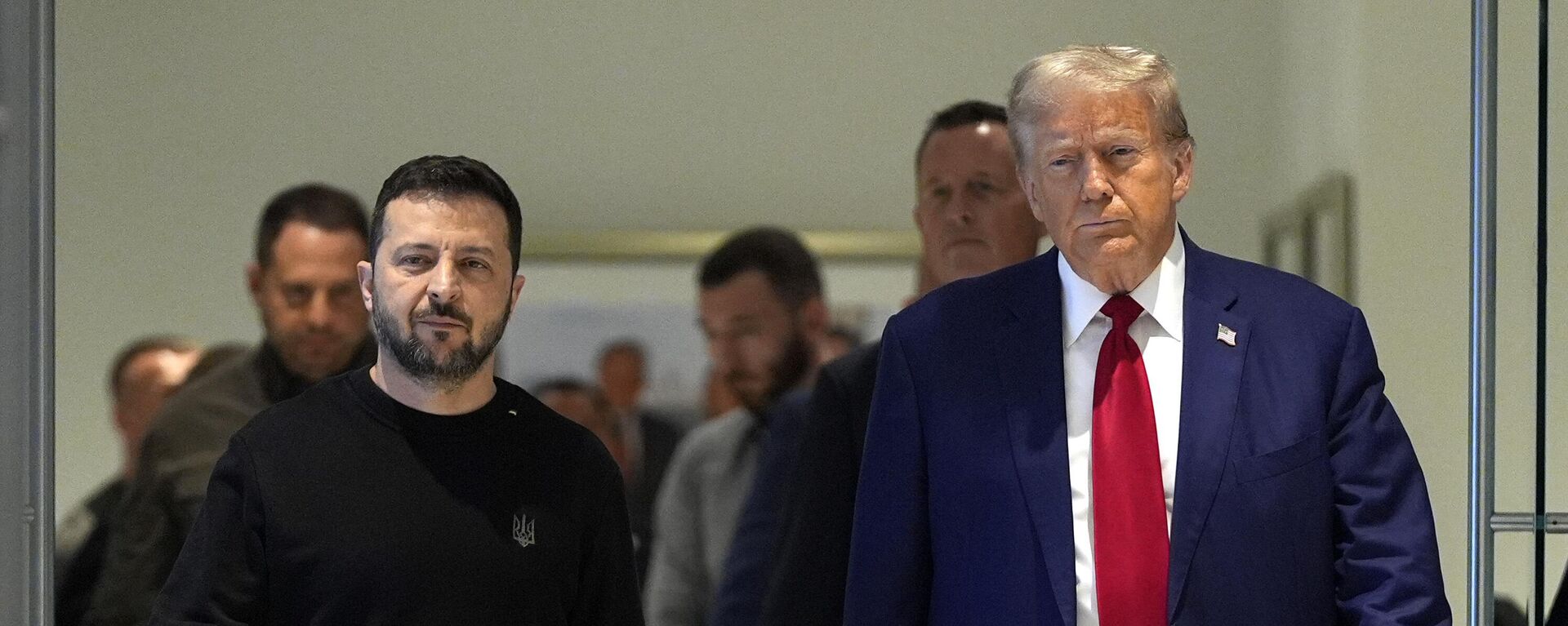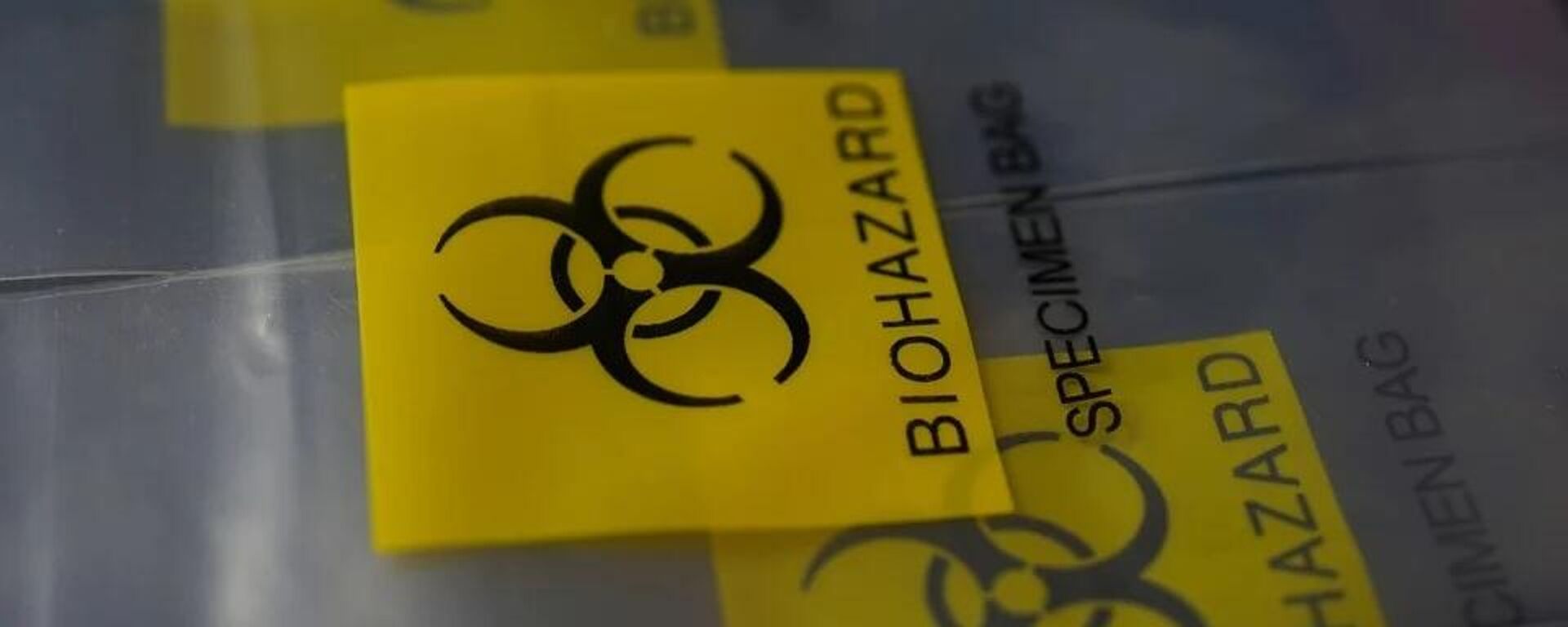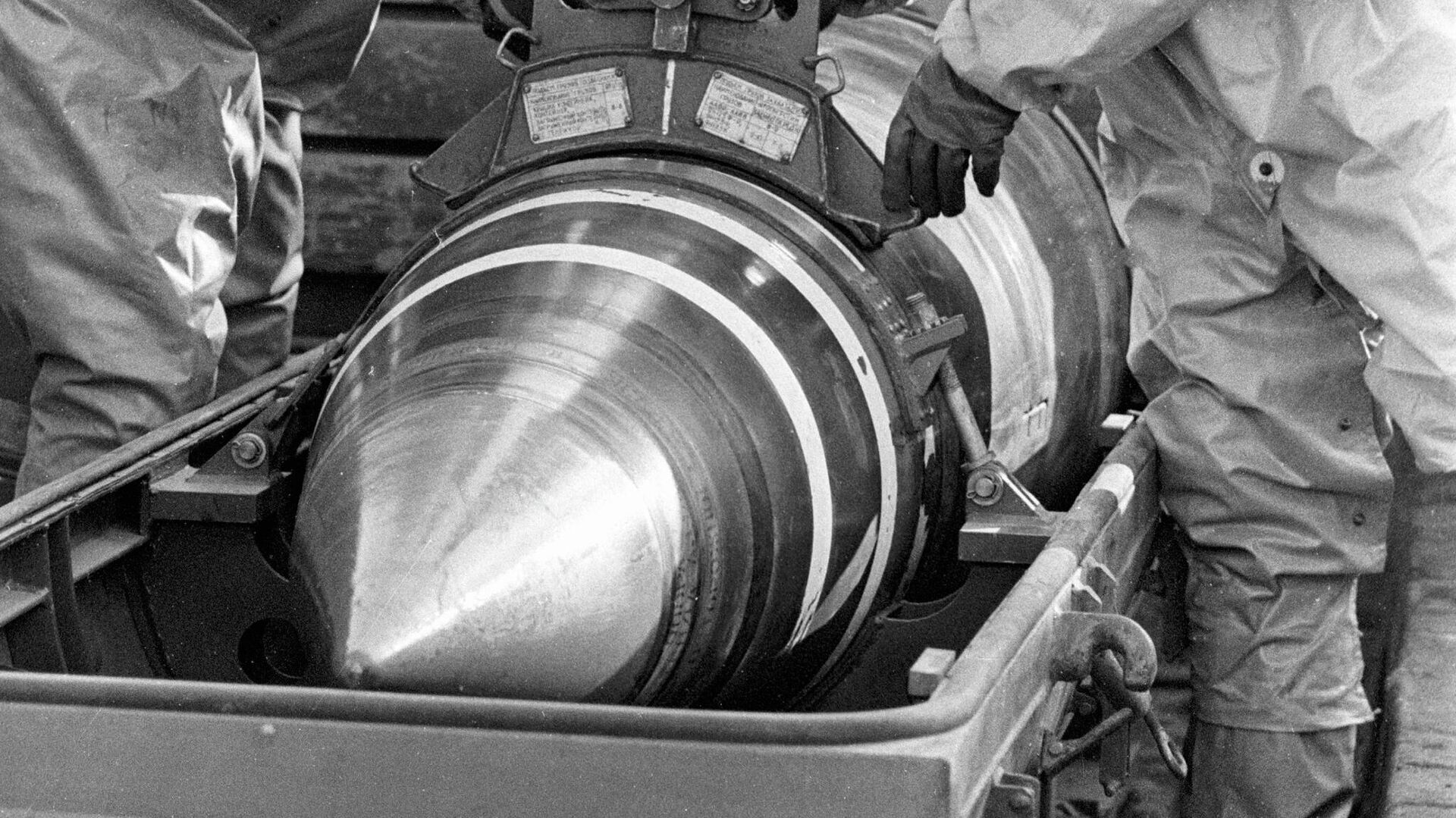https://sputnikglobe.com/20241115/ukraine-cant-build-a-nuke-without-russia-catching-them-top-us-nuclear-scientist-explains-why-1120895319.html
Ukraine Can’t Build a Nuke Without Russia Catching Them: Top US Nuclear Scientist Explains Why
Ukraine Can’t Build a Nuke Without Russia Catching Them: Top US Nuclear Scientist Explains Why
Sputnik International
A think tank briefing prepared for Ukraine's Defense Ministry has outlined Kiev's options for building a nuclear weapon if Donald Trump were to withdraw military assistance. A top US nuclear scientist and nuclear weapons expert tells Sputnik some of the almost insurmountable problems the Zelensky regime would face if it were to pursue the endeavor.
2024-11-15T14:07+0000
2024-11-15T14:07+0000
2024-11-15T14:07+0000
analysis
theodore postol
ukraine
russia
massachusetts institute of technology (mit)
volodymyr zelensky
donald trump
kiev
international atomic energy agency (iaea)
defense ministry
https://cdn1.img.sputnikglobe.com/img/07e6/02/15/1093244176_0:1524:2047:2675_1920x0_80_0_0_4444461b3b9278b2965e9125b17e6587.jpg
Ukraine’s military is trying to pressure its Western sponsors “into thinking that they might have to expand the war against Russia in order to deal with an escalation brought about by Ukrainian use of nuclear weapons against Russia,” but the chance of Kiev actually obtaining a bona fide nuclear device are minimal, says Dr. Theodore Postol, a veteran MIT physicist, nuclear engineer and ex-advisor to the US Navy on strategic nuclear weapons.“Both approaches require extremely sophisticated chemical facilities to dissolve highly radioactive spent fuel from a nuclear reactor. This fuel would have to be obtained from a nuclear reactor after it was irradiated within the reactor,” the academic explained.The resulting plutonium isotopes are highly unstable, Postol clarified, highlighting their tendency to disintegrate due to defects in their internal structure in a process known as spontaneous fission, which could cause a weapon to pre-detonate before it can be fully assembled.Even simply obtaining irradiated fuel rods from nuclear reactors for a nuclear device is also a no-go, he added, pointing to the IAEA Safeguards Program monitoring the burn-up and cooling of fuel in the course of reactor operations."In summary, the Ukrainian MOD statement is technical nonsense with regard to a credible threat that Ukraine could rapidly produce nuclear weapons – especially given that the activities would be highly visible, extremely time-consuming, and subject to obliteration by the Russians, who would surely not stand by and allow this activity to go on," the scientist emphasized.Facing backlash following the publication of the original The Times reporting on Ukraine's nuclear options, Ukrainian officials have rushed to walk back the claims made in the report, with a Foreign Ministry spokesperson assuring that the country does not possess nuclear weapons, does not intend to create them, and cooperates closely with the IAEA.This week's The Times report is not the first time Kiev has waved the nuclear stick around in the years-long confrontation with Moscow. In an EU summit in Brussels in October, Zelensky warned that Kiev would either get an invitation to NATO or a nuclear bomb. Russian President Vladimir Putin called the remarks a "dangerous provocation," and warned that "any step in this direction will be met with a corresponding reaction."
https://sputnikglobe.com/20241114/ukraines-bluster-about-making-nuclear-bomb-if-trump-scraps-us-aid-is-desperate-blackmail---analyst-1120883976.html
https://sputnikglobe.com/20241112/raw-materials-and-troop-deployments-how-zelensky-tries-to-woo-trump-with-revised-victory-plan-1120863511.html
https://sputnikglobe.com/20240827/ukraine-mulling-dirty-bomb-use-false-flag-chemical-provocations-with-us-help---russias-mod-1119926381.html
ukraine
russia
kiev
Sputnik International
feedback@sputniknews.com
+74956456601
MIA „Rossiya Segodnya“
2024
News
en_EN
Sputnik International
feedback@sputniknews.com
+74956456601
MIA „Rossiya Segodnya“
Sputnik International
feedback@sputniknews.com
+74956456601
MIA „Rossiya Segodnya“
can ukraine build a nuke, can ukraine get nuclear weapon, does ukraine have nuclear weapons, can ukraine build a nuke
can ukraine build a nuke, can ukraine get nuclear weapon, does ukraine have nuclear weapons, can ukraine build a nuke
Ukraine Can’t Build a Nuke Without Russia Catching Them: Top US Nuclear Scientist Explains Why
A think tank briefing prepared for Ukraine's Defense Ministry has outlined Kiev's options for building a nuclear weapon if Donald Trump were to withdraw military assistance. A top US nuclear scientist and nuclear weapons expert tells Sputnik some of the almost insurmountable problems the Zelensky regime would face if it were to pursue the endeavor.
Ukraine’s military is trying to pressure its Western sponsors “into thinking that they might have to expand the war against Russia in order to deal with an escalation brought about by Ukrainian use of nuclear weapons against Russia,” but the chance of Kiev actually obtaining a bona fide nuclear device are minimal, says Dr. Theodore Postol, a veteran MIT physicist, nuclear engineer and ex-advisor to the US Navy on strategic nuclear weapons.
“In order to produce the necessary plutonium for nuclear weapons Ukraine would have basically two choices to make – to try to produce a nuclear weapon using weapons grade plutonium or to try to use reactor grade plutonium,” Postol told Sputnik.
“Both approaches require extremely sophisticated chemical facilities to dissolve highly radioactive spent fuel from a nuclear reactor. This fuel would have to be obtained from a nuclear reactor after it was irradiated within the reactor,” the academic explained.
The resulting plutonium isotopes are highly unstable, Postol clarified, highlighting their tendency to disintegrate due to defects in their internal structure in a process known as spontaneous fission, which could cause a weapon to pre-detonate before it can be fully assembled.

14 November 2024, 13:57 GMT
Ukraine simply does not have the ability to manufacture weapons grade plutonium, and “if they tried to produce the industrial capacity to produce plutonium of any quality, they would engage in a highly visible process that would be immediately detected by the entire world, let alone the Russians,” Dr. Postol stressed.
Even simply obtaining irradiated fuel rods from nuclear reactors for a nuclear device is also a no-go, he added, pointing to the IAEA Safeguards Program monitoring the burn-up and cooling of fuel in the course of reactor operations.
“There is no way the Ukrainians could obtain the necessary irradiated fuel without first expelling the IAEA inspectors,” Postol said.
"In summary, the Ukrainian MOD statement is technical nonsense with regard to a credible threat that Ukraine could rapidly produce nuclear weapons – especially given that the activities would be highly visible, extremely time-consuming, and subject to obliteration by the Russians, who would surely not stand by and allow this activity to go on," the scientist emphasized.

12 November 2024, 10:37 GMT
Facing backlash following the publication of the original The Times
reporting on Ukraine's nuclear options, Ukrainian officials have rushed to walk back the claims made in the report, with a Foreign Ministry spokesperson
assuring that the country does not possess nuclear weapons, does not intend to create them, and cooperates closely with the IAEA.
On Thursday, Zelensky advisor Mykhailo Podolyak
tweeted that "even if Ukraine were able to develop such a weapon in the foreseeable future (which is not on the agenda), it could not deter an empire with the world's second-largest [sic] nuclear arsenal. This is evident."
This week's The Times report is not the first time Kiev has waved the nuclear stick around in the years-long confrontation with Moscow. In an EU summit in Brussels in October, Zelensky warned that Kiev would either get an invitation to NATO or a nuclear bomb. Russian President Vladimir Putin called the remarks a "dangerous provocation," and warned that "any step in this direction will be met with a corresponding reaction."
Zelensky made similar threats in February 2022, on the eve of the Ukrainian crisis's escalation from a civil conflict in the Donbass into a full-blown Russia-NATO proxy war, during a speech at the Munich Security Conference where he threatened to renounce Ukraine's non-nuclear status. Russian intelligence and the military's Radiological, Chemical and Biological Defense Troops have subsequently issued briefings on Ukraine's efforts to build a nuclear device, focusing on the dangers of a so-called dirty bomb (a conventional bomb containing radioactive material).

27 August 2024, 13:57 GMT





